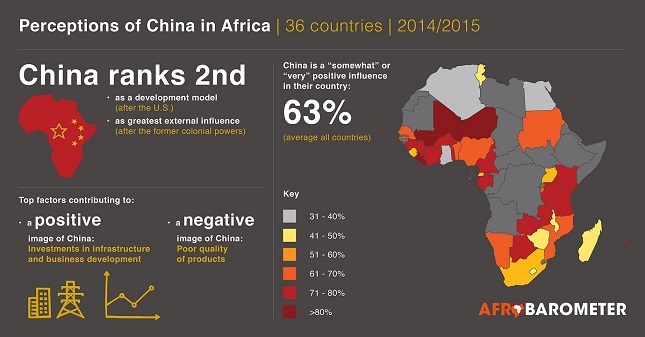
What African countries want are partners who are in it for the long haul and can deliver the best return on investment.
By Rosa Whitaker (Al Jazeera) |
China is not “moving relentlessly across Africa”. Despite what Peter Navarro, head of US President Donald Trump‘s National Trade Council has written, that China is “locking down strategic natural resources, locking up emerging markets and locking out the United States”, experience on the ground tells a different story.
China is competing aggressively for influence and market/investment share in Africa, but, in doing so, it is empowering African countries to chart their own course, pick their own partners and insist on their own priorities.
It is naive to think that China’s motives in Africa are purely altruistic – any more than those of the West. Beijing sees African commodities and consumers as essential to the long-term dynamism of its own economy.
To secure access to those commodities and simultaneously grow African markets for Chinese goods and services, China is deploying its state-owned enterprises to win African infrastructure contracts, supplemented by its banks to fund them.
Self-serving purposes?
The rewards promise to be substantial. The McKinsey Global Institute projects that by 2025, African household consumption and business-to-business (B2B) spending could reach $5.6 trillion. That is equivalent to nearly a third of current US gross domestic product (PDF).
China has its eyes on Africa’s economic takeoff and is investing heavily in the infrastructure needed to make it happen. In December 2015, President Xi Jinping pledged $60bn in new loans, exports credits, investment funds and grants.
The conservative calculations of Deborah Brautigam at the SAIS China-Africa Research Initiative, show that between 2000-2014, Chinese financiers had already channeled $86.3bn to African governments and state-owned enterprises. A figure equivalent to the total global exposure of the US Exim Bank as of 2016 (PDF).
It is equally naive to say that China is solely motivated by an aggressive desire to lock out the US and others from Africa’s minerals and markets, in the manner of Britain’s East India Company in the 18th and 19th centuries.
If mercantilist, colonial-style domination really were China’s primary motive, you can be certain that most Africans, mindful of a bitter past, would resist it fiercely.
Of course, size and wealth asymmetries put African countries at a disadvantage when dealing with major powers like China and the US.
Read the complete story at Al Jazeera
——
See also:
- FOCAC: Helping Ethiopia onto China’s Express Train of Development
- Ethiopia Desires More Investments from India than China: Negeri Lencho
- TDB Bank Approves $60mln Loan Request from Three Ethiopian Companies
- VIDEO: China Completes Aba-Samuel Hydropower Plant, Hands Over to Ethiopia
- Chinese Footwear Giant Huajian Group Brings Jobs, Economic Benefits to Ethiopia
